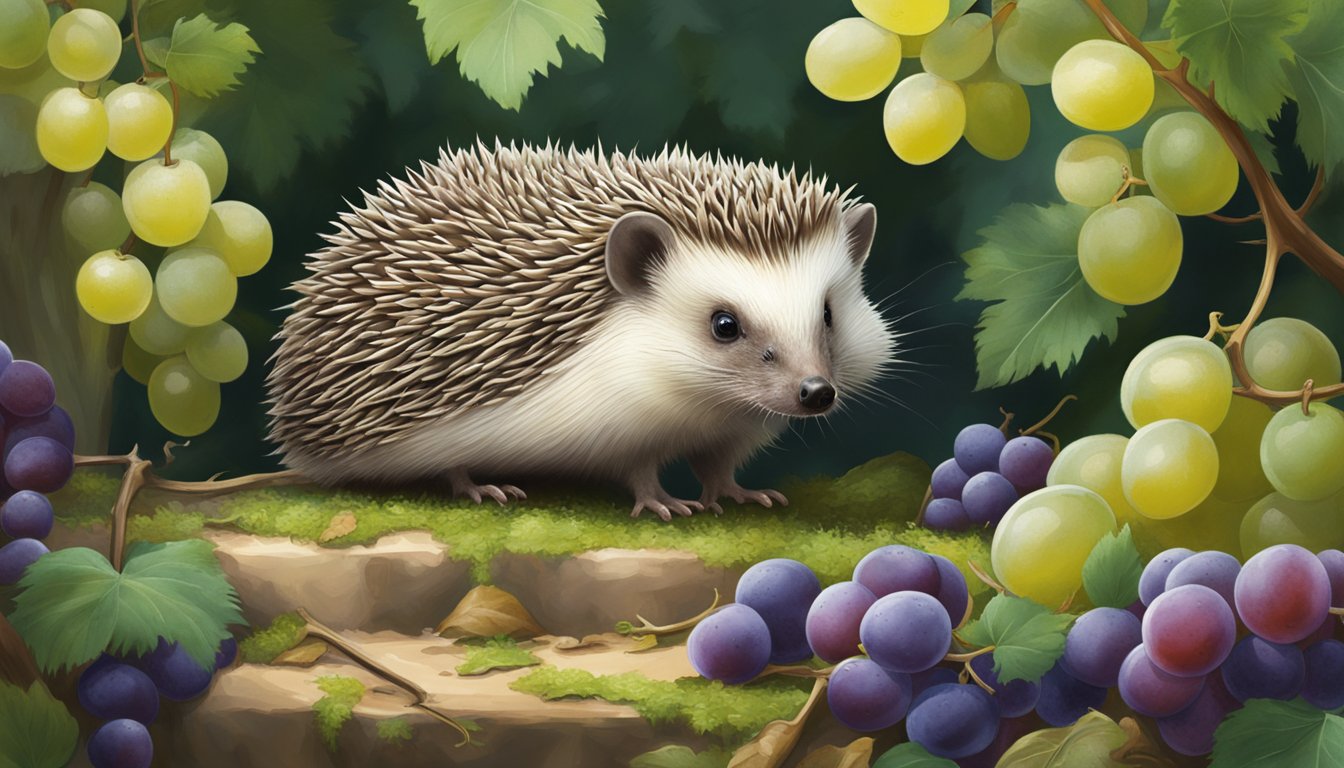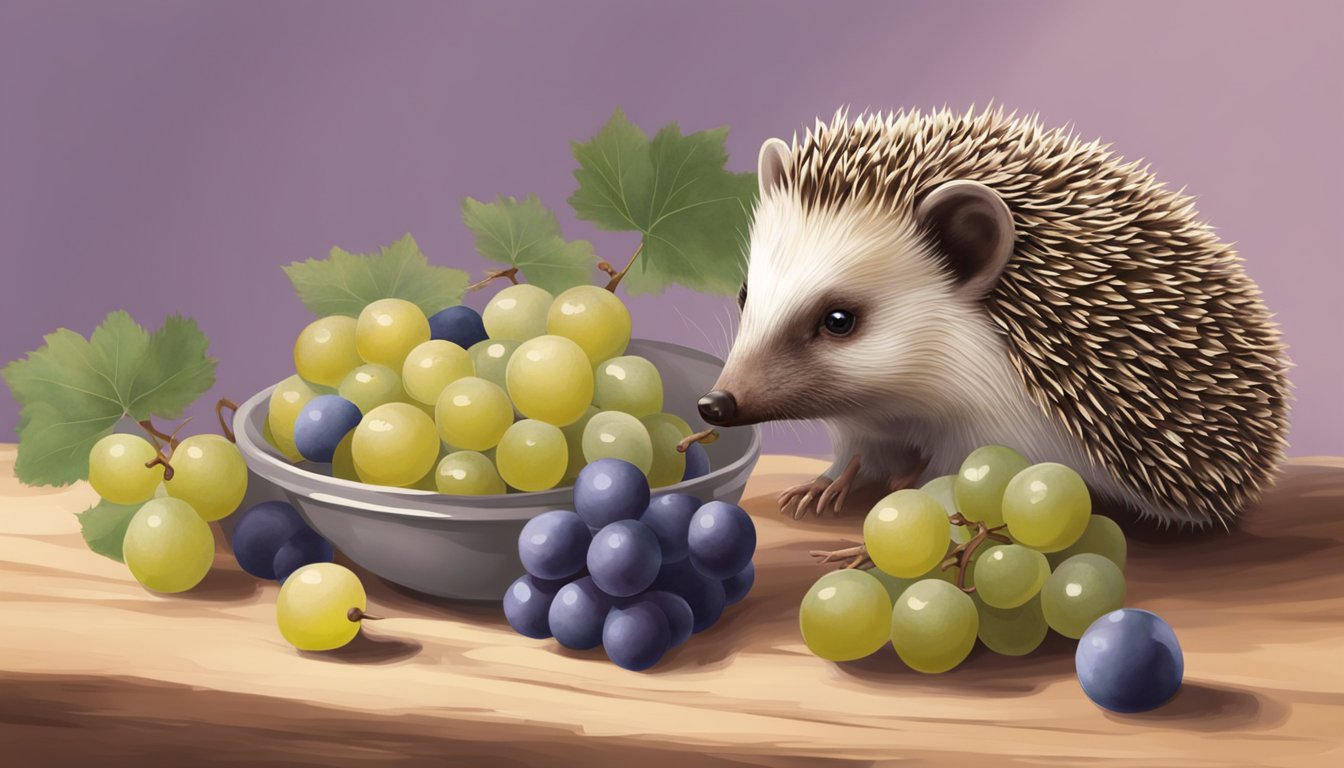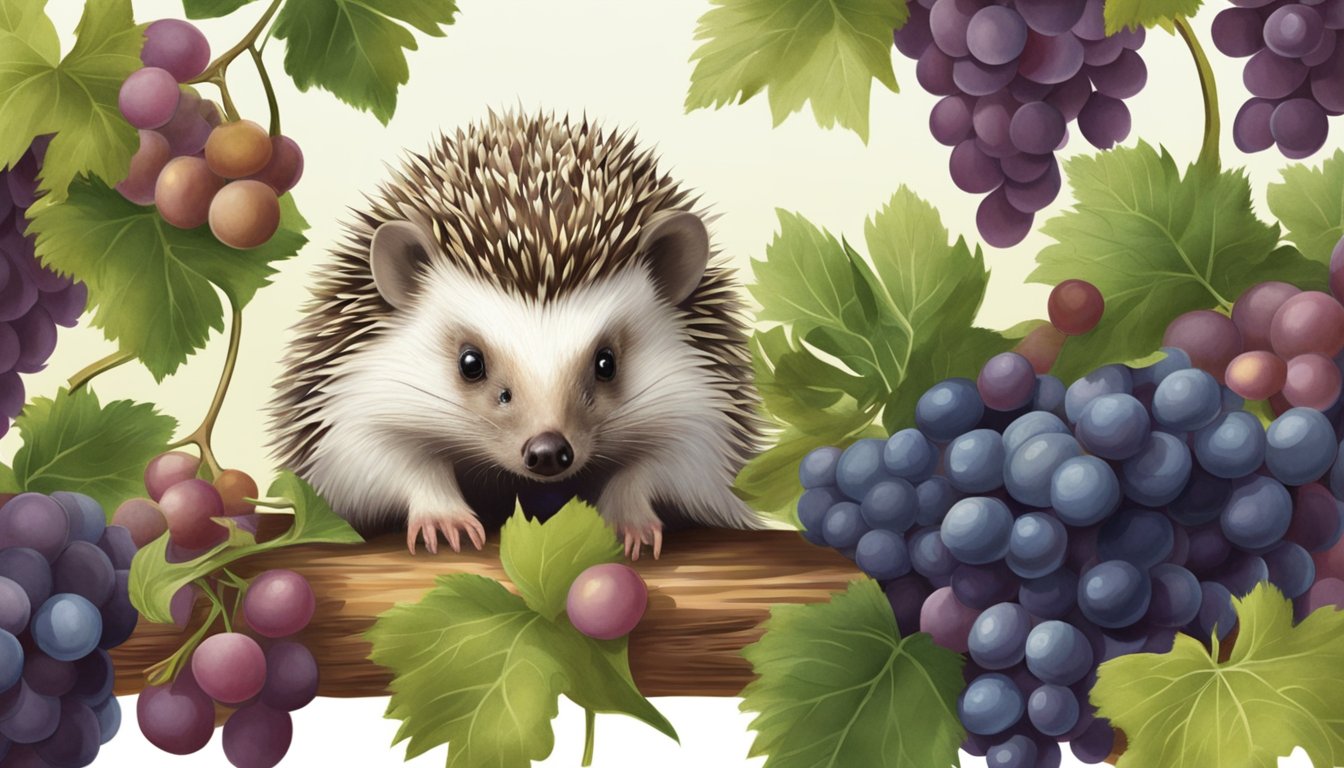When it comes to the diet of hedgehogs, it’s essential to understand what they can and cannot consume for their health and well-being.
Hedgehogs are omnivores, meaning their diet in the wild consists of various foods, including insects, fruits, and vegetables.
However, not all fruits are safe for these small mammals, and understanding the limitations of their diet is key for those who keep them as pets.

Key Takeaways
- Hedgehogs have an omnivorous diet but not all fruits are safe for them.
- There is conflicting information about the safety of grapes for hedgehogs.
- Responsible feeding practices are crucial for hedgehog health.
Grapes, while popular among humans, present a point of contention when it comes to feeding hedgehogs. Some sources suggest that grapes should be avoided due to potential toxicity, while others argue that they can be given in moderation.
Pet owners need to weigh these disparate views carefully. With the well-being of their spiny companions in mind, feeding grapes requires careful consideration of the existing recommendations and veterinary advice. Grapes are also toxic to dogs.
Hedgehog Diet Basics

Hedgehogs require a balanced diet of proteins, fruits, and vegetables to maintain optimal health. They benefit from various food items rich in omega fatty acids, vitamins, and minerals.
Safe Fruits for Hedgehogs
Fruits: Hedgehogs can enjoy various fruits as part of their diet. However, serving them in moderation is crucial to prevent obesity and maintain a balanced diet. Below is a list of safe fruits hedgehogs can eat:
- Apples: Ensure they are peeled and seedless.
- Berries: Strawberries, blueberries, and raspberries are good options.
- Melons: Watermelon, cantaloupe, and honeydew can be offered.
- Other Fruits: Pears and peaches can be included after removing pits and cutting them into small, manageable pieces.
Foods to Avoid
Certain foods can be hazardous to hedgehogs and should be strictly avoided:
| Toxic Foods | Reason to Avoid |
|---|---|
| Avocado | It is a choking hazard and can be high in fat. |
| Citrus fruits (e.g., oranges, lemons, limes) | High acidity can upset their stomach. |
| Dairy products | Hedgehogs are lactose intolerant and cannot digest dairy. |
| Chocolate | Toxic to hedgehogs and many other pets. |
| Nuts | They could be a choking hazard and can be high in fat. |
| Onions and Garlic | Can be toxic and cause blood cell damage. |
In addition to avoiding these toxic foods, it is also recommended to steer clear of high-fat proteins and processed foods not specifically made for hedgehogs. Instead, high-quality cat food, cooked eggs, and lean meats can provide the necessary proteins they need.
Always consult with a veterinarian for personalized advice on feeding your pet hedgehog.
Understanding Grapes and Hedgehogs

When considering feeding grapes to hedgehogs, it is essential to be aware of the potential health risks associated with their sugar content and acidity, and the importance of moderation to prevent obesity and toxicity.
Potential Health Risks
Though packed with antioxidants and nutrients, Grapes contain high levels of sugar and acid, which can be harmful to hedgehogs if consumed in large quantities. The sugar content of grapes poses a significant risk of obesity in hedgehogs, and their acidic nature might upset their digestion.
Additionally, grapes can carry pesticides, which can be toxic; thus, organic grapes are a safer option. Dried fruit, such as raisins, should be avoided entirely as these have an even higher concentration of sugar, which increases the risk of toxicity and potential death.
Moderation and Alternatives
To prevent health issues, hedgehogs should only eat grapes in moderation as an occasional treat, not as a diet staple. A balanced hedgehog diet includes various fruits and vegetables, lean protein, and plenty of fresh water.
Alternatives to grapes that are lower in sugar and safer for hedgehogs include small portions of apples, pears, and berries. It is critical to ensure that any treat given constitutes a minor portion of the hedgehog’s overall intake to maintain a balanced diet.
Feeding Practices and Recommendations
When considering a hedgehog’s diet, it’s essential to focus on age-appropriate nutrition and cater to special dietary needs to maintain their health.
Age-Specific Dietary Needs
Infant and juvenile hedgehogs require a diet rich in protein for growth, favoring insects like mealworms and worms that provide the necessary nutrients. On the other hand, elderly hedgehogs may require lower calories and fat to prevent obesity and mitigate health issues like diabetes and kidney problems.
A veterinarian can provide a tailored diet plan to ensure proper growth or maintain weight for aging hedgehogs.
- Protein Sources:
- Insects (mealworms, crickets)
- Cat food (meat-based, high in protein)
- Fiber Sources:
- Vegetables
- Limited fruits
Addressing Special Dietary Concerns
Hedgehogs, being omnivores, have diverse feeding habits. However, feeding them something outside their natural diet of insects and fruits, like grapes, could evoke adverse reactions. High sugar content can affect their weight and blood sugar levels, leading to health concerns.
It’s vital to monitor their intake and provide a balance of nutrients, focusing on their preference for a more natural diet. A hedgehog may enjoy a varied diet, but moderation and the quality of nutrients take precedence to avoid risks such as weight gain and diabetes.
Always consult a veterinarian for advice on a hedgehog’s diet, especially when considering feeding them human foods.
Final Thoughts on Hedgehog Nutrition
Hedgehogs require a well-balanced diet comprising primarily of proteins and fats, fibers, vitamins, and minerals to maintain their well-being. Their nutritional plan should mimic their natural diet, which consists of insects and other small invertebrates. A hedgehog’s health can be compromised by offering inappropriate treats that do not align with this dietary structure.
While some owners may contemplate feeding their hedgehogs fruits such as grapes, it is essential to note that these can be unsuitable due to their high sugar content and potential choking hazards.
Grapes also do not contribute significantly to their nutritional requirements and could lead to health issues such as obesity:
- High Sugar: Fruits with excessive fructose should be given sparingly, if at all.
- Choking Hazards: Small pets can choke on grape skins and seeds.
Offering fresh water daily is non-negotiable for a hedgehog’s health. It is just as vital as their food intake and should always be accessible.
When in doubt about what to feed a hedgehog or if a particular food item is safe, consulting a veterinarian is the best action. They can provide tailored advice that ensures the safety and health of these unique pets.
Owners must educate themselves on proper hedgehog nourishment to ensure their pets enjoy a nutritious and safe diet. By doing so, they safeguard their pets’ health and ensure they lead full, active lives.




Leave a Reply